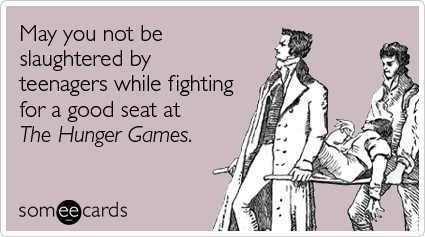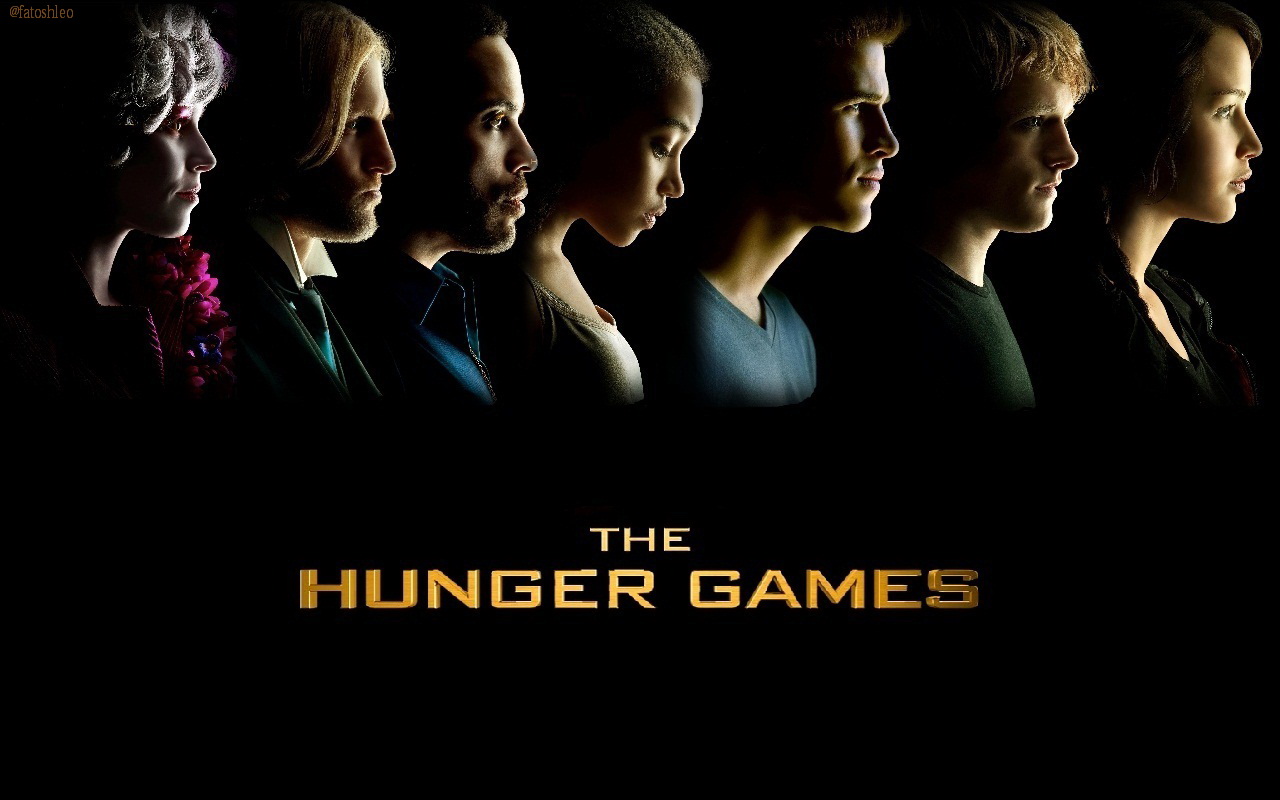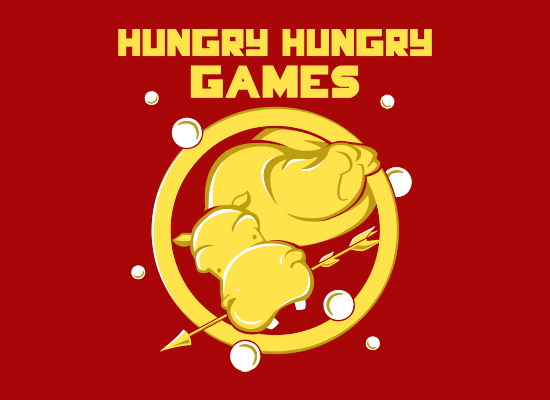“Could you survive on your own, in the wild, with everyone out to make sure you don’t live to see the morning?”
![]() For those who are interested in reading The Hunger Games novel or seeing the movie in the future, I’ve – very kindly – inserted a spoiler alert icon for you (in case the title of this post was not clear enough in its intent.)
For those who are interested in reading The Hunger Games novel or seeing the movie in the future, I’ve – very kindly – inserted a spoiler alert icon for you (in case the title of this post was not clear enough in its intent.)

To be honest, with all this fuss around The Hunger Games trilogy, I really thought the movie would turn out to be one of those fan-girl craze subjects again. Being one who is opposed to the unnecessary popular public uproar of a novel, I cannot tolerate any of that “Team Gale vs. Team Peeta” folly. However, what I was curious in, was the proceedings of the movie (hmm, what extreme measures might a die-hard fan undertake at the theatre that I can ridicule at…?), so I’ve dared to risk my life. On the date of the movie release, I stepped out into the open air, and cautiously inched my way towards Chinook Theatre. (My brother described these actions as being pregnant with fan-like ambitions, going to the movies on the day of its release. The shame! Nah. I truly was just interested in the viewer turn-out for the movie and how the movie would be developed from a novel written in first person. Scratch the ridiculing part.) To my surprise, the theatre was not as full as expected – even at the start of the movie. My sincere thanks to the e-card shown above!
The Novel
It’s been such a long time since I’ve read the novel. But there are several things in the novel that were really well done and left an impression in my mind. First of all things, it was the concept that Suzanne Collins based the book upon that captured my interest. The Hunger Games, it was known, was a…”tradition” of sorts that was compulsory for the citizens of Panem to attend, imposed upon by the Capitol. The people were forced “to send one boy and one girl between the ages of 12 and 18 to participate in the annual Hunger Games, a fight to the death on live TV,” as indicated by the book synopsis. I thought this really reflected some of the oppression faced by the people of our society today; for example, how youth are subjected to the idea of “school,” a system that enforces strict rules upon student behaviour – including the way of thought. Especially recently, after writing several essays in English class, I found that we, as students, are more and more restricted to certain paths of thinking, and are penalized when we wonder off the beaten – or “right” – path. Collins challenges these ideas and rules our society has set and allows the reader to reflect upon it. This concept of the Hunger Games is also very different from the popular teen reads of today (vampire this, supernatural that) which makes it stand out brilliantly against the rest of the novels. The book itself has a fine balance of genre (fantasy, sci-fi, action, romance) so that a broad range of readers will be able to enjoy the book (of course, this will prove to be untrue for the rest of the trilogy, much to my personal distaste.) It is undeniable that Suzanne Collins uses effective writing techniques and intricate descriptions of events that brings this ultimate experience to life.
On the downside, as a reader I find that sometimes Katniss Everdeen, the protagonist, proves to be a very underdeveloped character who has random and rash actions that one does not expect her character to take, making her even more fictional. She takes what one would consider to be unintelligent actions and voices them in simpleminded, halfwitted clauses; her sentiment adds to this flaw, clouding her judgement. It is then in these situations she illustrates details that the reader does not need or want to read about. This really impedes the storyline and the reader’s interest in the book.
The Movie

The cast of the movie was pretty well chosen; the actors and actresses reflected and presented their character and their appearance quite adequately, so that was a relief (no one would want to suffer through 2.5 hours of the movie with horrible acting and cast, right?) Overall, the movie portrays the book really well, and therefore also the events of the book. For example, the effects – such as the excitement for the Hunger Games radiating from residents of the Capitol – were really well represented [insert loud cheering and enthusiasm from over-dressed fashion clowns here], and the way the movie’s production team highlighted the setting with the effects was one of the many things to admire. What I enjoyed most of the movie was being able to see “behind the scenes” – how the game makers were able to control the battle arena through their advanced technology. Also, the movie, being shot in third-person, was able to eliminate Katniss’s excessive thoughts from the novel, making it a more engaging experience for the viewer.
On the other hand… the downs of the movie. One of the biggest flaws of the movie was that the producer tried too hard in incorporating all the events from the book into the movie, condensing them in such a way that the plot was underdeveloped countless times throughout the film. This was seen in Katniss’s lack of struggle in the games – for example, right after she got burnt from the conflagration, the sponsors sent her the ointment she needed to heal; whereas in the book, she agonized for almost a day before she received what she needed to continue on. I find that the actors and actresses lacked emotion and vibe in certain instances, too, and that was a real pitfall of the film, as it made the experience and characters less real. What was really disappointing in this was the absence of revolt that Haymitch possessed as a drunkard, the charisma that Peeta had in the book but lacked in the movie, the devotion to protecting her family Katniss failed to express in the movie took away from their character and made them less dynamic than they should have been. And last but not least, the impoverished state District 12 was in was not addressed fully in the production of the film. The Capitol was not as grand as thought to be from the book – the dull, monotonous fire costume that Katniss and Peeta wore at the opening ceremony being one specific example. This led to the lack of contrast between life in the districts and in the Capitol; the oppression of the people of the districts failed to show because of it.
All in all, despite the flaws of both the novel and the movie, The Hunger Games proved to be a great success among the public. And as Haymitch noted, “young love” and other things of sorts from the games, can give us the hope and the fantasy we need to continue on our daily (mostly uneventful) lives. It gives us the hope for our imperfect society – may the odds be ever in our favour, that is.




